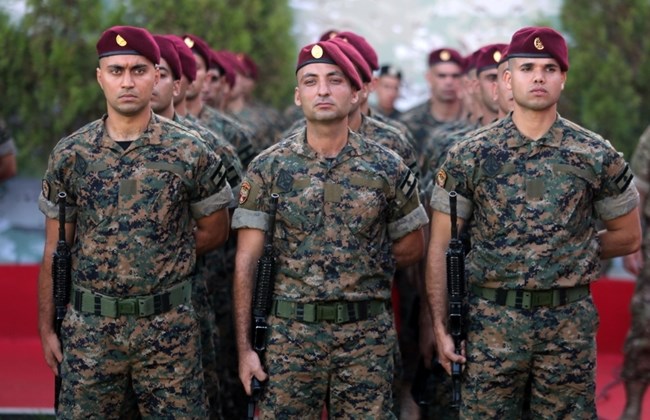Congress Should Be Wary of Funding the Lebanese Armed Forces

Photo Credit: Hasan Shaaban (Lebanon Daily Star)
American policymakers must revisit the recent decision to spend over $100 million of taxpayer money on advanced weapons for the Lebanese Armed Forces (LAF). Conceivably these armaments could reinforce Hezbollah against Israel or other Iranian proxies threatening the United States and its allies around the Middle East.
The Trump Administration is now the third consecutively to presume such aid will reduce Hezbollah’s influence in Lebanon. As highlighted in a recent report by the Hybrid Warfare Task Force at the Jewish Institute for National Security of America (JINSA), Tehran’s main terrorist proxy and Beirut have been growing closer politically and militarily for years.
Since the last war between Israel and Hezbollah in 2006, the United States has provided nearly $1.7 billion to the LAF. These funds help maintain and upgrade U.S.-supplied tanks, armored vehicles, artillery, aircraft and small arms. They also support security operations on Lebanon’s border with Syria and counterterrorism efforts against ISIS.
At the same time it has received U.S. funding, the LAF has come increasingly under Hezbollah’s sway. When war broke out with Israel in 2006, the government in Beirut explicitly distanced itself from Hezbollah by calling for the group’s disarmament and blaming it publicly for starting the conflict.
However, as the Syrian conflict erupted they coordinated deployments of weaponry and troops, shared intelligence and conducted joint operations against ISIS. In May 2018, Hezbollah’s coalition won a majority in Lebanon’s parliament for the first time, compounding its political influence over the LAF.
Most glaringly, Beirut has conspicuously failed to enforce U.N. Security Council Resolution 1701 prohibiting Hezbollah’s rearmament in southern Lebanon – even as the LAF increases its deployments in this area near the Israeli border.
Principally alarming for the United States, Lebanese President Michel Aoun, a Hezbollah ally, has proclaimed “as long as the Lebanese military lacks the power to stand up to Israel, [Hezbollah’s] arms are essential, in that they complement the actions of the army and do not contradict them. They are a major part of Lebanon’s defense.” Hezbollah’s leader Hassan Nasrallah calls the LAF a “partner” and “pillar” against Israel.
Perhaps the best example of this relationship came in recent months, amid Israel’s discovery of Hezbollah’s attack tunnels dug in violation of Resolution 1701. Despite being tasked with enforcing this resolution, LAF soldiers aimed their weapons at Israeli units neutralizing the tunnels – not at Hezbollah.
The failure of the LAF and U.N. peacekeepers to prevent Hezbollah’s rearmament highlights the challenges Israel will face in the next war on its northern border. Dangerous as the tunnels would be, the main threat is Hezbollah’s rocket and missile arsenal which has advanced by an order of magnitude since the last war – all under the radar of the U.N. and LAF.
Israel will confront significant operational challenges trying to neutralize these missiles before they can devastate Israeli infrastructure and cities. While Israel largely avoided targeting non-Hezbollah assets in 2006, that will not be the case if the LAF supports Hezbollah in the next round of conflict.
At that point, the United States effectively would be funding both sides of a major Middle East conflict that threatens the strategic viability of our closest regional ally Israel.
Hezbollah’s growing influence over the LAF has alarmed key Lebanese leaders and elements of the military who seek a future for their country beyond Tehran’s shadow. American political and economic support for these forces could help curb Hezbollah’s influence in Lebanon.
More immediately, Congress should exercise its oversight role on security assistance and encourage these moderates by scrutinizing the LAF’s relationship with Hezbollah. This could include making U.S. Foreign Military Sales cases and other support contingent on verifiable efforts by the LAF to assist U.N. peacekeepers in locating and removing Hezbollah armaments in southern Lebanon, as required by U.N. Security Council Resolution 2373.
To uphold the stated goal of helping the LAF secure Lebanon’s borders, Congress should also condition aid on demonstrable interdiction efforts against well-known routes for Iranian arms transfers to Hezbollah, including Beirut airport, Lebanese ports, and key Syrian border crossings. Ultimately, American policymakers must be prepared to terminate assistance if U.S. weapons are being used by Hezbollah.
Moreover, hearings should be convened by both Armed Services Committees in Congress to review LAF-Hezbollah ties and implementation of assistance to the LAF. Building on recent measures against Hezbollah finances, the Treasury Department should consider sanctions for LAF and Lebanese officials that violate their country’s Resolution 1701 obligations by assisting Hezbollah.
Lebanon could indeed become an important U.S. security partner in a historically volatile region. This will only occur if American policymakers demand an appropriate return on the hundreds of millions of taxpayer dollars invested in making the LAF a genuine force for counterterrorism.
Originally appeared in RealClearDefense on February 18, 2019.